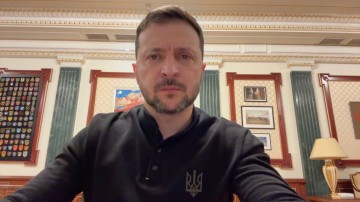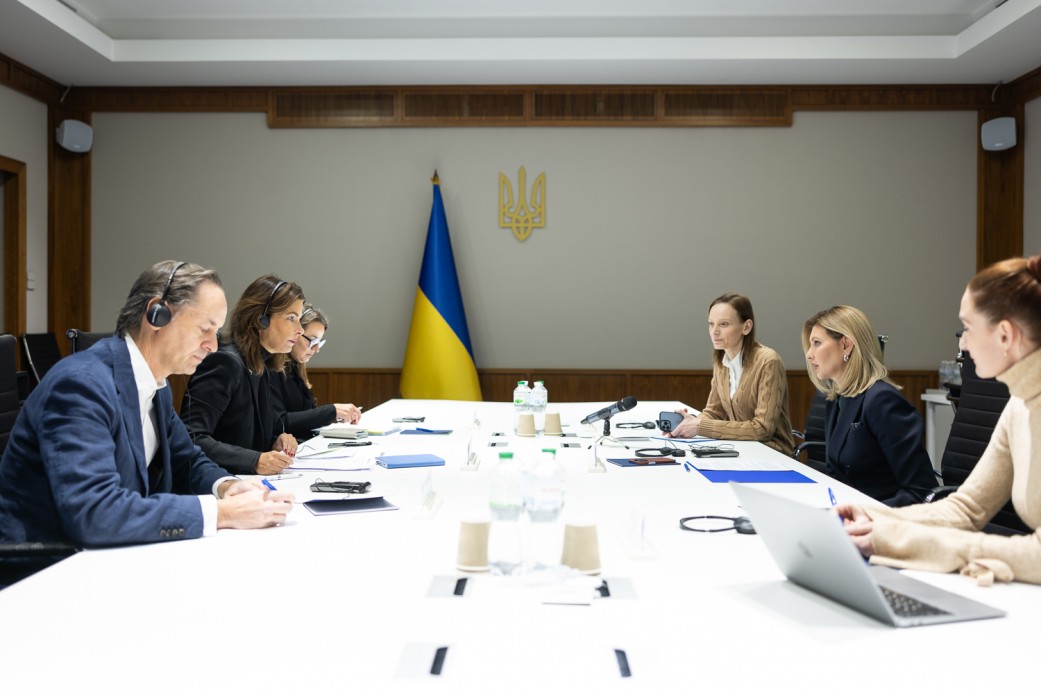First Lady of Ukraine Olena Zelenska met with representatives of Google – Vice President for Government Affairs and Public Policy Annette Kroeber Riel and Vice President for Central and Eastern Europe Patrick Warnking – who arrived in Kyiv.
The President's wife thanked for many years of fruitful partnership in various spheres of cultural and public life, as well as for the company's principled position during Russia's full-scale invasion of Ukraine.

In particular, Google was one of the first to apply sanctions against Russia. The company suspended advertising in Russia and cooperation with Russian advertisers. YouTube removed over 9,000 channels and 70,000 videos that distorted the truth about Russian aggression.
On February 26, 2022, Google indefinitely suspended the monetization of Russian state media in the world, including RT and Sputnik, and on March 2, YouTube blocked all channels in Europe associated with Russian state media.
Google has also expanded cybersecurity for Ukrainian accounts and helped Ukrainian government resources and media to protect against DDoS attacks.
Olena Zelenska emphasized that correct answers to Google searches are now part of information security for the whole world.
In preparation for the meeting, the First Lady held a series of consultations with sectoral ministries to gather their most relevant and urgent requests.
"I want to draw attention to an issue that is of fundamental importance to us. This is an incorrect depiction of the territory of Ukraine by the service, which we have been dealing with since 2014, since the beginning of Russia's temporary occupation of the Autonomous Republic of Crimea and the city of Sevastopol. Depending on the country or region from which the query "Україна" or "Ukraine" is made, Google Maps displays Ukraine differently: if the query is made from the territory of Ukraine, Google Maps displays Crimea as part of Ukraine, if the query is made from the territory of the Russian Federation, Google Maps displays Crimea, which is an integral part of Ukraine, as part of the Russian Federation. If the request is made from Europe, Google Maps shows Crimea as a disputed territory. We count on your support in resolving the issue of incorrect display of the map of Ukraine on the Google platform in accordance with the internationally recognized borders of 1991, regardless of the user's location," the President's wife said.

She also emphasized the need to de-russify Google search.
"We thank you for the partial de-russification of search and call for more active de-russification of Google search results for Ukrainian users in Ukraine and abroad when Ukraine is selected in the operating system or browser settings," she said, adding that this also applies to typical YouTube recommendations, which are now also predominantly Russian.
"We urge you to disassociate Ukraine from the CIS space in the YouTube settings and change the automatic display of Russian-language content for users from Ukraine and from Ukrainian IP addresses, as well as change the automatic display of recommended and popular content for Ukrainians from Russian to Ukrainian and European content," the President's wife added.
Olena Zelenska offered the company's representatives joint projects in the field of mental health. She emphasized that a sociological survey conducted for the third Summit of First Ladies and Gentlemen in 11 countries showed that mental health, along with poverty, is among the top five challenges for the world, and that it is the biggest challenge for young people and adolescents.

The First Lady called for continued cooperation on children's online safety: "Internet safety for children, adolescents and young people remains a crucial issue as a prevention of mental disorders and problems, and we are interested in continuing to work with Google Ukraine to increase the number of solutions such as Google Interland, a game that teaches children to be polite online, distinguish between truth and fraud, share information and keep their personal data safe."
The President's wife also suggested creating a library of quality content on mental health.
"In a difficult situation, when there is no one to turn to or you don't want to open up, many of us look for help on Google," she said.
Olena Zelenska emphasized the need to put psychological aid centers that are being created as part of the All-Ukrainian Mental Health Program on Google maps.
She also emphasized the importance of cooperation in creating a barrier-free environment for Ukrainians.
"Google has digital solutions and information and educational components that are not yet open or localized for Ukraine, but could be useful for people with disabilities and low-mobility categories of the population, for adults and children with hearing, visual, cognitive, autism spectrum disorders,” the First Lady said.
The parties also discussed cooperation in the digitalization of Ukrainian cultural heritage and museums, including the creation of immersive exhibitions to spread Ukrainian culture and knowledge about it around the world.

"We are grateful to Google for its support of Ukraine and active cooperation, in particular in the field of culture and art (Google Arts & Culture / GAC). It is known that the GAC platform has one of the largest digitized and consolidated visual art libraries, which contains many works by Ukrainian authors. Unfortunately, due to historical reasons, a significant number of works still have a false identification - their origin is defined as Russian. We look forward to further cooperation with Google to determine and change the identification of artists," the President's wife noted.
The First Lady also spoke about the work of the Olena Zelenska Foundation, including a project to provide teachers and students with technology for distance education.
"The need for devices remains relevant. In total, more than 516 thousand Ukrainian students and more than 80 thousand teachers need gadgets. That is why we do not stop," she said.
Through the Foundation's projects, any foreign philanthropists and companies can contribute to direct assistance to Ukrainians.
"Google is known for always looking for new ways to use technology to positively impact the world. We are ready to find these ways together. Because it is important not only for Ukraine, but also for the whole world that the word "Google" continues to mean finding a quick and objective answer to any vital question," Olena Zelenska summarized.




